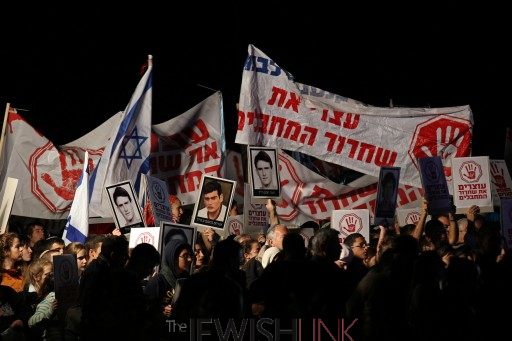Israel – Almagor Terror Victims Association chairman Meir Indor told the Knesset Interior Committee that several terror victims’ families had not been informed about which prisoners had been slated for release before their names reached the press.
“The equation ‘freeing prisoners equals talks’ or ‘freezing settlement construction equals talks’ is wrong, and the government has to stop this,” Knesset Interior Committee chairwoman Miri Regev (Likud Beytenu) said.
Regev called the committee meeting to discuss how the soon-to-be-released prisoners were chosen.
An Interior Ministry representative at the meeting said he did not know how the terrorists were selected or who made the list.
Indor complained that only seven of the 16 families of victims of the terrorists being released had been notified before the list of prisoners was sent to the press.
“This is an injustice on top of the even bigger injustice of releasing prisoners,” he said.
Justice Ministry attorney Yifat Raveh said that the ministry began contacting families two hours before the list became official, but did not successfully reach everyone.
Regev told the Justice Ministry representative that the process of notifying families should have begun earlier, not the same night the names were being released to the press, since a tentative list had been made a week earlier.
MK David Tsur (Hatnua) continued his party’s line of blaming the Bayit Yehudi Party for prisoner releases, saying that the government had a choice of gestures it could have made at the beginning of talks – negotiating on the basis of 1949 armistice lines, freezing settlement construction or freeing terrorists – and that the worst was chosen because of pressure from the right-wing party.
“Bayit Yehudi ministers are responsible for the prisoner release because they prevented any other option in order to avoid a political backlash,” MK Tamar Zandberg (Meretz) said.
Indor asked Tsur if he thought that Palestinian prisoners would have been released once an agreement was reached, even if one of the other options had been chosen, and Tsur said, yes.
“So this is just a scheduling matter?” Indor asked incredulously. “Human lives are not a down payment.”
“In any other place in the world, if someone murdered a Jew and the government wanted to release him, we would shout that it’s an injustice,” MK Shuli Moalem-Refaeli (Bayit Yehudi) added.
Regev said that “no normal country in the world frees murderers,” and Zandberg accused her and other “second-tier Likud MKs” of letting out their frustrations at the government even though it is led by their party.
Content is provided courtesy of the Jerusalem Post
